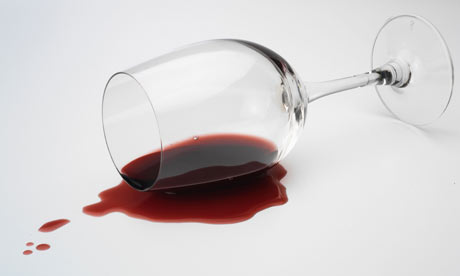
The case against drinking alcohol has been promoted for so long and with such vigour that even I have started to wonder whether I shouldn't perhaps give it up altogether. I have occasionally done this before without huge difficulty, but have never found it at all easy to drink in what is officially regarded as "moderation" – that is, the maximum of 21 units of alcohol a week (equivalent to less than three bottles of wine) that men are advised to imbibe.
The dangers of excessive drinking have been stated so often and so menacingly that practically everyone must be aware of them by now. The list of its purported health risks is impressive: liver disease, osteoporosis, pancreatitis, stomach ulcers, infertility, heart disease, stroke, dementia, brain damage, breast cancer and cancer of the gullet. And its supposed social effects are just as bad: crime, violence, road deaths, and 17m working days lost in Britain each year. It is claimed, furthermore, that alcohol is a factor in at least 33,000 deaths annually in this country. You'd have to be a very devil-may-care kind of person to go on drinking heavily without any anxiety or guilt.
If the warnings in Britain are not a sufficient deterrent, there is always the example of Russia where, according to President Medvedev, alcohol represents a "national disaster". He has launched a new campaign to stop Russians drinking themselves to death and causing the country's population of 142 million to fall by about 700,000 a year. Drink is blamed for the fact that the average life expectancy of Russian men is still hardly more than 60 years. Meanwhile, in Britain, Professor David Nutt has been dismissed as the government's chief drugs adviser after insisting that alcohol is actually more dangerous than ecstasy, LSD and cannabis.
All this had brought me to a point at which I was poised to go on the wagon when this week I was given cause to hesitate. Research widely reported in the newspapers found that men drinking at least eight glasses of wine a day (that's well over a bottle) had their chances of getting heart disease reduced by more than 50%. It had always been grudgingly admitted that wine could be a factor in preventing heart disease, but been insisted at the same time that this only worked if it was consumed in very small quantities. The new research suggests that, on the contrary, the more wine you drink, the greater your protection. And having had a mini-stroke a few years ago, and having ever since taken pills to lower the risk of strokes or heart attacks, I tend to worry more about my heart than about my liver.
Furthermore, while even the advocates of temperance do not blame excessive drinking for the deaths of more than 33,000 Britons a year, heart disease is said to kill three times as many. So one might conclude that if everyone drank a least a bottle of wine a day, many thousands of lives would be saved. This is a cheerful thought, but not a very convincing one. All it really does is strengthen my conviction that most health surveys of this kind can be made to mean anything and therefore shouldn't be published at all.
Tony's wavering faith
A friend of mine, who lives close to the country home of Tony and Cherie Blair in Buckinghamshire, attends the Anglican parish church of All Saints in Wotton Underwood, the Blairs' village. On a recent Sunday, he arrived at an 8am holy communion service when a large black limousine drew up and spewed out the former PM and his wife, who, accompanied by security men, joined the congregation inside. But the Blairs are Roman Catholics – she since birth, he a recent convert – so what did they think they were doing worshipping in an Anglican church? It is not as if there was no Catholic church they could have attended – there is one at Long Crendon, four miles away – but, on this occasion, it was the Church of England that they chose.
Tony Blair is, of course, ecumenically minded. He set up his faith foundation to foster harmony among the world's religions. But you would think that, given the choice, he would have preferred a Catholic church to a Protestant one. He was converted only two years ago after sometimes attending mass with his wife (and once being ticked off by the late Cardinal Hume for taking communion when, as a non-Catholic, he should not have done so) and said in a speech last summer in Italy: "Ever since I began preparations to become a Catholic, I felt I was coming home . . . this is now where my heart is, where I know I belong."
This is also rather a tense moment in relations between the Roman Catholic and Anglican churches, with the Archbishop of Canterbury under pressure to take a stronger line against the Pope's bid to attract mass conversions to Rome by discontented conservative Anglicans. You might think that now, more than at any other time, Blair might choose to assert his allegiance to his new church. Could it be that, like some of the Anglican priests who converted to Rome but then returned to the Church of England, he is already disappointed with his new "home" and feeling nostalgic for the old one? Not very likely, I agree. In the same speech in Italy, Blair confessed that it was his instinct to want "to please all of the people all of the time" and maybe he has the same urge with churches.
This week: Alexander watched Blyton on BBC4, starring Helena Bonham Carter as the famous children's author, and wondered if she could really have been quite as nasty as that: "As a child, I loved my Enid Blyton books and was heartbroken when my elder brother, in a fit of Savonarola-like rage, burned them all."

